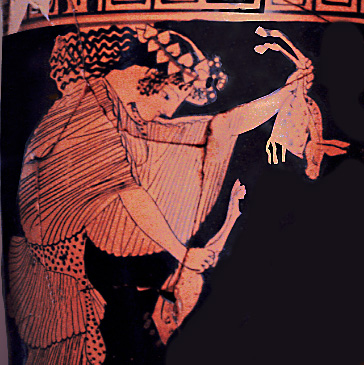
Sparagmos (Ancient Greek σπαραγμός) refers to an ancient Dionysian ritual in which a living animal, or sometimes even a human being, would be sacrificed by being dismembered, by the tearing apart of limbs from the body. Sparagmos was frequently followed by omophagia (the eating of the raw flesh of the one dismembered). It is associated with the Maenads or Bacchantes, followers of Dionysus, and the Dionysian Mysteries.
Examples of sparagmos appear in Euripides's play The Bacchae, which concerns Dionysus and the Maenads. At one point guards sent to control the Maenads witness them pulling a live bull to pieces with their hands. Later, Dionysus lures his cousin, king Pentheus, into a forest after he bans worship of the god where he was attacked by Maenads, including his own mother Agave. The reference of his mother tearing apart his limbs is sparagmos. Similarly, Medea is said to have killed and dismembered her brother whilst fleeing with Jason and the stolen fleece in order to delay their pursuers (who would be forced to collect the remains of the prince). The Italian film director Pier Paolo Pasolini staged a sparagmos ritual as part of a long sequence near the beginning of his film Medea (1969), before dramatising the episode in which Medea kills her brother in a similar way. In Tennessee Williams's play Suddenly, Last Summer, Sebastian Venable is killed in an episode of sparagmos and omophagia.
thanks a lot wikipedia















Aucun commentaire:
Enregistrer un commentaire